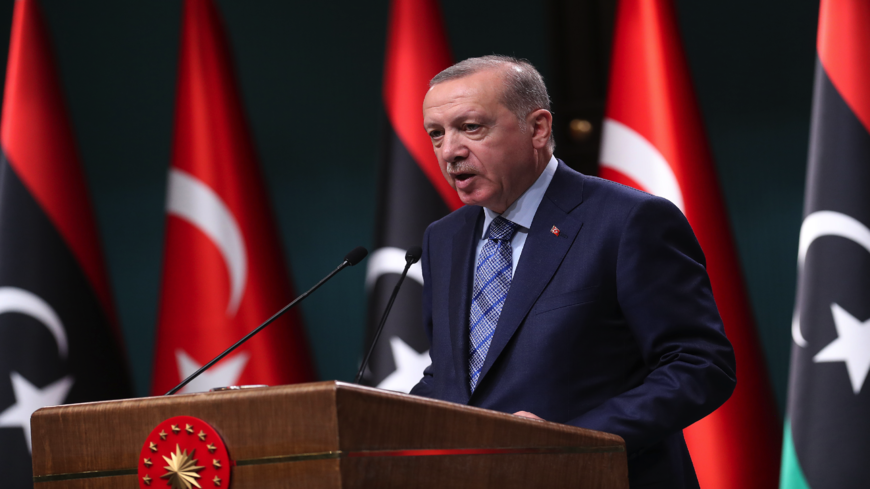Turkish President Recep Tayyip Erdogan is no visionary, and his Libyan policy may well carry the high risk of a miscalculation leading to a dangerous military confrontation with Egypt.
According to one of the four experts who spoke at “The Fight for Libya” webinar organized July 22 by a United Arab Emirates-based think tank, this has been the recurring theme. The webinar was held on the same day as the announcement of the Turkish-Russian joint statement on Libya, which some consider a slap at Ankara’s Libya policy.
It was only two days after the Egyptian parliament authorized military intervention in Libya. There was speculation that Turkish-backed Government of National Accord (GNA) forces were about to launch an attack on Egypt and the UAE-backed Khalifa Hifter forces to seize control of Sirte province and al-Jufra air base.
Egyptian President Abdel Fattah al-Sisi declared the two strategic locations a month ago to be Egypt’s “red line.” Sirte, the hometown of late Libyan leader Muammar Gadhafi, stands out as a door opening to Libya’s oil-rich regions lying between Tripoli and Benghazi.
For Turkey, which initially emerged as a “game-changer” in the Libyan conflict with its robust support of the GNA that broke Hifter’s siege around Tripoli, there would be no cease-fire until Sirte and al-Jufra were controlled by the GNA. That was made explicit by Turkish Foreign Minister Mevlut Cavusoglu, who said declaring a cease-fire is not to the advantage of the GNA.
Yet despite the possibility of a direct military confrontation between Turkey and Egypt, there are also astute assessments that neither side really wants or is ready for that.
“For many in Egypt’s military leadership, the disastrous intervention in the north Yemen civil war remains a cautionary experience that has influenced Cairo’s lack of appetite for foreign military adventures despite its emphasis on martial power and its regional projection,” read a July 13 report by the Foreign Policy Research Institute. “This institutional hesitation presents yet another limitation that may effectively stop Cairo from going beyond a symbolic intervention in Libya that would look to counterbalance Turkey,” the report added.
Only 10 days after Cavusoglu’s statement, Russia stepped in. And on July 22, Moscow extracted a Turkish pledge for “creating conditions for a lasting and sustainable ceasefire” in Libya, the joint statement announced after a series of ministerial-level meetings between Ankara and Moscow. The “high-level consultations” were initiated during Russian leader Vladimir Putin’s visit to Istanbul on Jan. 9 to “de-escalate the situation on the ground and pave the way for a political process in Libya.”
Turkey and Russia disclosed that they agreed on four points, of which the following two are the most important: “Continue joint efforts, including encouraging the Libyan parties, with a view to creating conditions for a lasting and sustainable cease-fire,” and “facilitate the advancement of the intra-Libyan political dialogue in line with the conclusions of the Berlin Conference” that was held in September 2019 with the participation of major powers.
In short, Turkey committed itself, upon Russian demand, to refrain from going to war for Sirte and al-Jufra. Also, the reference to “intra-Libyan political dialogue” might be interpreted as Turkey, albeit implicitly, conceding to accepting Hifter as a party in the peace process, given the Libyan leader was also present at the Berlin Conference.
In a sense, the point reached between Turkey and Russia is by no means a diplomatic victory for Erdogan; on the contrary, it is a vindication for Sisi.
It is even more interesting to note that Russian Foreign Minister Sergey Lavrov’s remarks came only an hour after the announcement of the Turkish-Russian joint statement.
“The situation in Libya we’re dealing with now is rooted in NATO’s aggression carried out [in] 2011 in gross violation of the UNSC resolution. The external players, especially those from outside the region, couldn’t have cared less about Libyan people [and] statehood,” Lavrov was quoted as saying on the Russian UN Mission’s official Twitter account. He was careful enough not to mention the name of Turkey as a NATO member “from outside the region.”
“Unlike many other external players, Russia has never tried to place any bet in the Libyan game. We have always worked with all the political forces in Libya, had them visit Moscow at various times, and we continue to maintain contact with them now,” Lavrov stated in another tweet. The insinuation is clear. Moscow is working with Hifter who, according to Ankara, is a “putschist warlord.”
“Libya’s neighbors including Algeria, Tunisia, Egypt should play the most important role, because [this is] about stabilizing a country that is their immediate neighbor. Security of Algeria [and] Libya’s other neighbors depends on how successfully problems are resolved,” a third tweet by Lavrov stated.
As such, Russia hasn’t only legitimized Egypt’s involvement in the Libyan game but also succeeded in having Turkey on board the diplomatic track.
Hence, a Turkish-Egyptian war looks to have been averted. In this respect, Turkey’s presidential spokesperson Ibrahim Kalin’s explanation to Reuters following the Turkish-Russian joint statement is no more than face-saving.
“For the cease-fire to be sustainable, al-Jufra and Sirte should be evacuated by Hifter,” Kalin told the news agency, referring to a demand that was expressed by Erdogan.
All those who have faith in Erdogan’s Libyan policy, which is now contained by Russia, can count on the inconsistency of Turkey’s president. There is nothing permanent for Erdogan. Hence, although a war with Egypt that could have erupted due to his miscalculation is averted for the time being, one can never know what the near future might bring. The risk of war in Libya involving Turkey has not been permanently prevented.
By Cengiz Candar
Source: Al-Monitor



